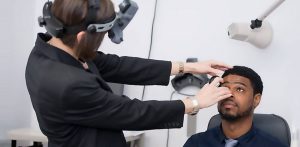Stanford University: Concussions and Oculo-Motor Dysfunction
This month, a presentation was given by Dr. Jamshid Ghajar, MD, PhD, FACS at the Stanford Brain Performance Center (Department of Neurosurgery and Stanford Athletics),
Read MoreAre You Suffering From Post-Concussion Symptoms?
Up to 90 percent of people experience post-concussion symptoms for many years… until they receive effective treatment from a neuro-optometrist. Post traumatic vision syndrome (PTVS)
Read MoreFourth Nerve Palsy
Fourth Nerve Palsy, also known as Superior Oblique Palsy or Trochlear Nerve Palsy, occurs when the fourth cranial nerve becomes diseased or damaged. The fourth cranial nerve controls the actions of the superior oblique eye muscle and is responsible for turning the eye inward and downward.
Read MoreSuffering From Low Self Esteem?
Low self esteem can be one of the most challenging emotions experienced by patients following a traumatic brain injury. Even a mild traumatic brain injury
Read MoreManaging Concussion: A Team Approach
Author: Dr. Aaron Nichols Excel Neuro-Optometric Clinic Concussions are one of the most complex injuries to treat, but with a team approach of a range
Read MoreVisual Rehabilitation FAQs
These are the 10 most frequent questions asked to vision therapy eye doctors on vision therapy following a head injury. You may easily find answers to your questions below. If you still have questions, contact your nearest eye doctor experienced in TBIs, concussion and vision therapy
Read MoreWhat Is Post-Traumatic Vision Syndrome?
Over 90 % of concussions and traumatic brain injuries (TBIs) result in some degree of visual dysfunction. Post traumatic vision syndrome (PTVS) is the clinical
Read MoreTraumatic Brain Injury and Neuro-Optometry
What is a neuro-optometrist? Neuro-optometrists diagnose and treat visual problems related to neurological conditions and traumatic brain injuries (TBI). Through rehabilitative treatment, neuro-optometrists retrain and
Read MoreVision and Vestibular Dysfunction
Do you often experience dizziness or feel as though the world is spinning around you (vertigo)?
Do you experience motion sickness, or a persistent sense of unsteadiness or imbalance? You may have an inner ear disturbance called Vestibular Dysfunction. The good news is that these symptoms can be significantly reduced with vision therapy, allowing you to regain your quality of life.
Vision Problems from a Brain Injury
Can a brain injury cause vision problems? Yes, any traumatic brain injury (TBI) can have significant visual consequences. During the initial treatment of a concussion or other traumatic brain injury (TBI), visual problems are often overlooked. Frequently, visual problems are hidden or neglected— lengthening and impacting rehabilitation.
Read More5 Essential Facts About Traumatic Brain Injuries
Have you suffered a brain injury? Here are 5 facts that are essential to know: A traumatic brain injury (TBI) is an injury to the
Read More










